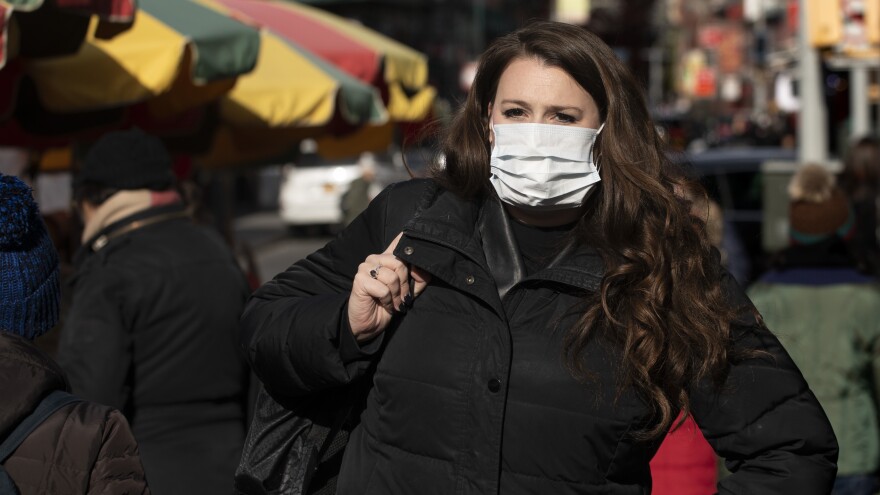Updated at 7:25 p.m. ET
The U.S. State Department is warning Americans not to travel to China, issuing its most serious travel advisory one day after the World Health Organization declared the Wuhan coronavirus to be a global health emergency. The virus has spread to at least 22 countries, and more than 250 people in China have died.
Americans who are already in China "should consider departing using commercial means," the State Department said Thursday night. The advisory for China now stands at "Level 4: Do Not Travel" — the same category the U.S. uses for Yemen, Libya and South Sudan.
Two major U.S. airlines are halting all flights to and from China's mainland, citing the State Department advisory. American Airlines says its operations are now suspended and will remain on hold through March 27. Delta says it will stop flying to China after a final flight on Feb. 3, and it won't resume operations until after April 30. Delta's last return flight from China will take off on Feb. 5.
A number of other countries have issued similar travel warnings to their citizens, though many are focusing on Wuhan's Hubei province, where most of the cases have occurred, rather than the entire Chinese mainland.
Singapore, for example, announced Friday that all foreign nationals who traveled to China within the past 14 days "will not be allowed entry" or transit through the island nation, which has 16 confirmed cases of the new strain of coronavirus.
Singapore's government also says anyone holding a Chinese passport won't be given a visa to enter the country unless they can prove they haven't recently been to China.
"It is going to hurt us," Singaporean Prime Minister Lee Hsien Loong said Friday. He added that some 3 million Chinese tourists visit Singapore in a normal year.
The number of confirmed coronavirus cases worldwide has risen to nearly 12,000 — surpassing the 8,099 reported cases of SARS (severe acute respiratory syndrome) during a 2003 outbreak.
In Hong Kong, researchers who study respiratory illnesses say the coronavirus outbreak is only getting started.
Those scientists are saying "this outbreak is just in its early stages, and they expect it to get a lot worse before it gets better," NPR's Jason Beaubien reports. "Chinese officials seem to also feel that way. They're actually building two brand-new hospitals right now in Wuhan to treat patients from this outbreak. So clearly they think this is going on for a while."
The outbreak of SARS killed at least 744 people — more than three times the current death toll for the coronavirus — and spread to 32 countries after it was identified in China's Guangdong province. The hardest-hit areas other than the Chinese mainland were Hong Kong, Singapore and Canada.
In Singapore, Lee says that while the new coronavirus seems to be more infectious than SARS, it has also been less lethal.
"The death rate is much lower, and in China, they are reporting that maybe about 20% of the cases they see become seriously ill," he said, adding that there is no need to panic.
The U.S. warning came hours after WHO declared the outbreak to be a global health emergency Thursday, putting the coronavirus strain — identified as 2019-nCoV — in the same category as the H1N1 flu, zika, polio and Ebola.
On Thursday, the Centers for Disease Control and Prevention confirmed the first known instance of person-to-person coronavirus transmission in the U.S. A woman who had traveled to Wuhan spread the virus to her husband when she returned to Chicago, according to health officials. Both patients are in their 60s and were hospitalized in stable condition, the Illinois Department of Public Health said. It added that the risk to the public remains low.
In fact, Americans are far more likely right now to become infected with the influenza or flu virus. The CDC estimates that more than 15 million people in the U.S. have gotten sick with flu this season, as NPR's Allison Aubrey has reported. "More than 150,000 Americans have been hospitalized, and more than 8,000 people have died from their infection," she says. "And this isn't even a particularly bad flu year."
China's National Health Commission says more than 102,000 people are under medical observation out of concern that they may be infected with the deadly respiratory virus.
"With fears of a global contagion, a growing number of commercial carriers have reduced or suspended services in and out of the country," NPR's Julie McCarthy reports from Manila in the Philippines. "China has suspended group tours. The new travel restrictions are closing China's contact with the world, cutting off businesses and tourism."
Copyright 2021 NPR. To see more, visit https://www.npr.org.







